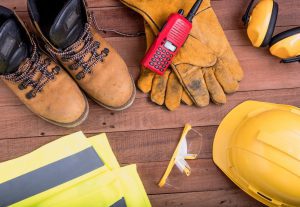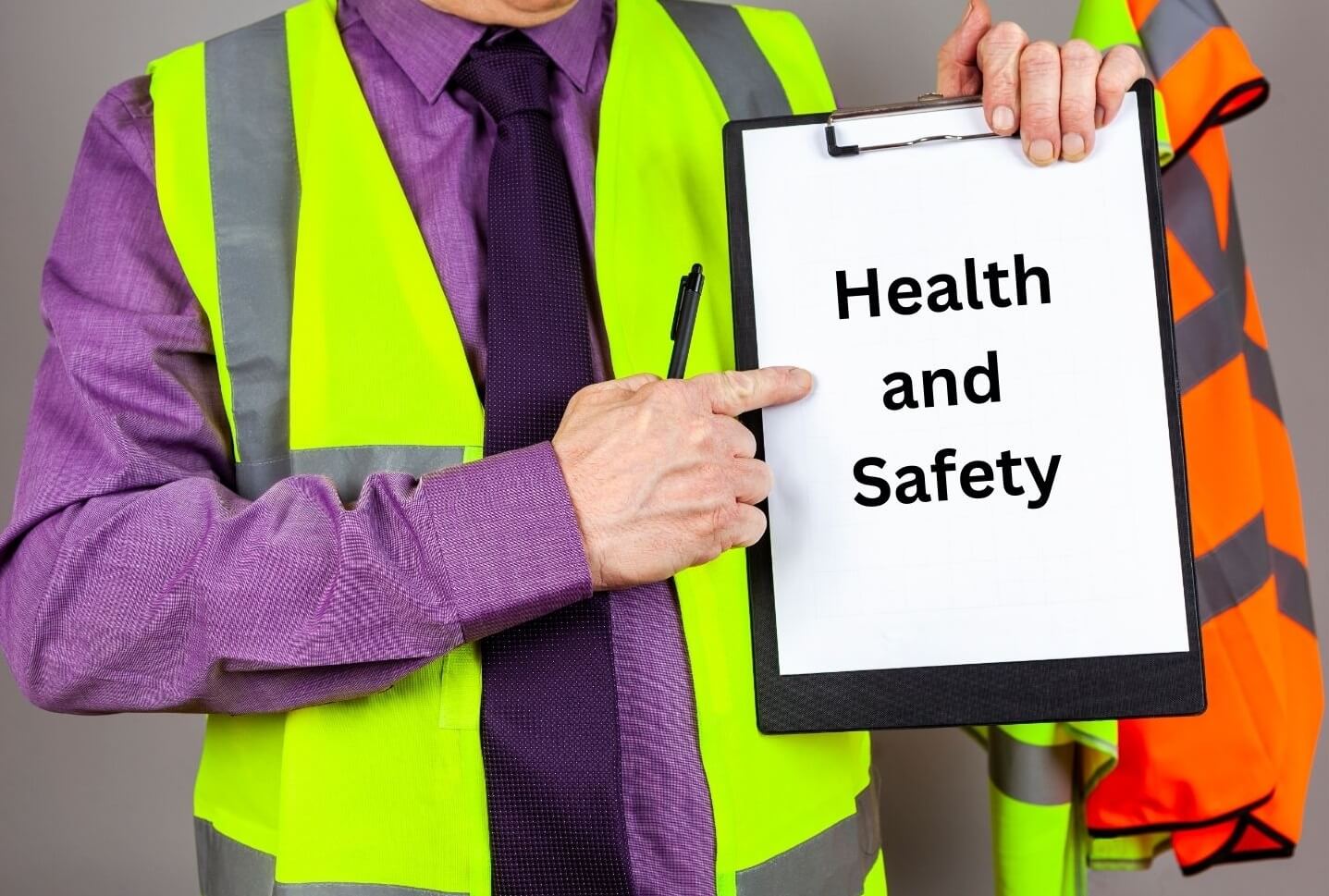What Are the Main Types of Health and Safety Officers?
To become a health and safety officer, it takes a particular combination of formal education and professional qualifications alongside relevant work experience. Health and safety officers (or occupational health and safety officers) routinely check that work environments comply with the regulations and that employees work in a safe environment free from hazards. These officers are employed in different industries and have other safety requirements. Here is a general overview of companies’ various types of health and safety officers.
- Construction Health and Safety Officer: To become a health and safety officer, you ensure that construction sites meet health and safety regulations, assess the risks of building projects, ensure workers wear protective gear, and prevent accidents on construction sites.
- Manufacturing Health and Safety Officer: These are generally found in the manufacturing sector, where their role is to monitor a factory environment to ensure the safe use of machinery and chemicals; they will be involved in procedures and training to reduce workplace accidents and also place greater focus on complying with safety standards.
- Environmental Health and Safety Officer: To become a health and safety officer, you will ensure you comply with any environmental regulations and workplace safety. They will typically focus on waste management, pollution control, and the safe use of hazardous materials.
- Corporate Health and Safety Officer: Corporate health and safety officers monitor employees’ health and safety and assist them while working in an office environment. Corporate health and safety officers must ensure that the office environment is safe and ergonomic for all employees and complies with regulations for assessing and controlling risks such as slips, trips, falls, fire safety, and health and safety laws.
- Healthcare Health and Safety Officer: Healthcare Health and safety officers in healthcare settings check that hospitals, clinics and other healthcare facilities are safe for staff, patients and visitors, ensuring that medical equipment, hazardous substances, infection control and fire safety are all dealt with properly.
- Construction Design and Management (CDM) Coordinator: To become a health and safety officer, you make sure that the health and safety of a construction project are considered in the design and planning stages of the project and that risk assessments and other measures are introduced at the planning stage and carried out throughout the project so that all parties comply with the relevant laws on health and safety.
- Mining Health and Safety Officer: Officers in this field work in the mining sector to ensure workers comply with safety standards. Their main competence areas are hazardous materials, underground work and heavy machinery.

What Does a Health and Safety Officer Do?
A health and safety officer’s job is to ensure that a workplace is healthy and safe and complies with relevant health and safety legislation. Their goal is to minimise risk, prevent accidents and promote a culture of safety at work. Therefore, here is a step-by-step breakdown of what such an officer might do.
- Carry out Risk Assessments: To become a health and safety officer, you conduct Risk Assessments daily. They are looking for potential hazards in the workplace by doing routine or scheduled inspections. They determine the likelihood and impact of accidents. They then provide recommendations to eliminate or reduce these risks.
- Safety Policies: To become a health and safety officer, you develop and implement safety policies. These officers create and enforce health and safety policies to fit the needs of the workplace. This includes creating safety procedures, emergency protocols and guidelines for handling hazardous materials.
- Keep the Environment Clean: Local government officers address public sanitation and hygiene issues, collect and dispose of rubbish and sewage, and clear snow and ice from roads. They enforce laws and regulations, for example, by issuing fines for littering or dog fouling.
- Train Employees: One of the important responsibilities of a health and safety officer is to train employees on safe work practices, such as lifting techniques; the use of personal protective equipment (PPE) such as masks, gloves, eye protection goggles, and respirators; and fire evacuation procedures. Sometimes, they train employees on the handling of hazardous substances.
- Investigate incidents and accidents: Once an accident or near-miss has happened, a health and safety officer will investigate the occurrence, drawing up reports and recommending preventative measures. They will attempt to uncover the root of the issue to make changes to procedures or the physical work environment that will reduce the chance of the same problem arising again.
- Keep Safety Records: To become a health and safety officer, you are required to keep records of all accidents and safety incidents that occur, as well as records of all safety inspections that are carried out. These records can help identify trends, ensure compliance, and provide evidence during a health and safety audit or in an enquiry.
- Advise on equipment and machinery: To become a health and safety officer, you will work closely with employers and maintenance teams to ensure that machinery and equipment are safe to use. They provide advice on safety equipment and ensure regular maintenance and inspections.
- Promote a Safety Culture: To become a health and safety officer, you can foster a safety culture by encouraging reporting hazards, following safety procedures, and taking individual responsibility for safety.

Average Health and Safety Officer Salary
This essay will discuss how much a UK health and safety officer earns. It will consider different experiences and qualifications and how much they earn in other sectors. This overviews what a health and safety officer earns in the UK.
- Entry-Level Health and Safety Officer: To become a health and safety officer just starting will be expected to earn around £25,000-£30,000 per year. Newly appointed officers usually have less experience and may be supervised by a more senior professional.
- Mid-Level Health and Safety Officer: Working at this level will bring in between £30,000 and £40,000 a year and may involve more responsibility, such as managing a team or undertaking a safety audit.
- Senior Health and Safety Officer: Salaries for an experienced senior health and safety officer are £40,000 to £55,000 per annum, climbing into six figures in some of the heaviest regulated industries, such as oil and gas.
- Health and Safety Manager: As might be expected, health and safety managers, responsible for ensuring the safety and well-being of all organisational staff, earn around £45,000 to £70,000, depending on the company and type of business.
Health and Safety Officer Skills
To be an effective health and safety officer, you need technical knowledge, attention to detail and communication skills. To succeed in this profession, you must proactively identify health and safety risks and ensure that the workplace adheres to rules and regulations. Here are the most important skills for a career as a health and safety officer:
- The health and safety regulations: Health and safety officers must understand relevant legislation, such as the Health and Safety at Work Act, and industry-specific regulations. They need to keep up-to-date with changes to legislation so that the workplace complies.
- Risk assessment: Conducting the evaluation is the core of the matter. Health and safety officers must identify hazards, assess the risks they cause, and ensure effective control measures are employed.
- Attention to detail: Attention to detail is about spotting potential dangers and health and safety regulations breaches, even in routine maintenance activities or on a checklist. It is about thorough inspections and insistence that reports are clear and accurate.
- Communication Skills: Employees need to understand health and safety policies. Consequently, health and safety officers must communicate these policies in writing and verbally to employees at all levels, from entry-level workers to senior managers. Excellent verbal and written communication skills are essential. Working conditions are dangerous, so employees and visitors must understand the rules. Health and safety officers need strong communication skills to conduct training sessions, write reports and investigate incidents.
- Problem-solving: When hazards or violations are identified, health and safety officers must develop practical and effective solutions to eliminate or reduce risk. Effective problem-solving requires critical thinking.
- Interpersonal Skills: The health and safety officer must often communicate closely with employees at all company levels. Building trust and maintaining a positive relationship with others is critical to ensure that they can influence safety culture.
- Organisational skills: Health and safety officers must keep records of incidents, organise training, and ensure that all policies are in place and followed. Strong organisational skills help managers to fulfil this role.

Health and Safety Officer Tips
For aspiring health and safety officers, some advice for building a career might be:
- Gain Work Experience: Many health and safety officers start by working in supporting roles, as health and safety advisers or site supervisors, before eventually specialising in health and safety. A background in safety-critical areas such as construction or manufacturing or within the environment sector will help build up knowledge of workplace risks and best practices.
- Health and Safety Training: Take training in health and safety to build up your credentials. Many health and safety professionals take courses such as the NEBOSH General Certificate or IOSH (Institution of Occupational Safety and Health) certifications.
- Stay Current on Regulations: There are ongoing changes to health and safety laws and regulations. So, it is important to keep current. Subscribe to industry newsletters, attend seminars, and join a professional organisation like IOSH.
- Skill Development: Suppose you want your employees to become effective accident investigators. In that case, these are the skills they will need to develop: Develop Investigation Skills, Gather evidence, interview witnesses, and write accident reports.
- Join a professional body such as IOSH or NEBOSH: If you’re serious about health and safety, join one of these professional bodies. You’ll meet other health and safety professionals, find out about vacancies, receive mentoring and guidance from those with more experience, and stay current on best practices.
Health and Safety Officer Requirements
To become a health and safety officer, it takes a particular combination of formal education and professional qualifications alongside relevant work experience. Here is what it takes to become one in the UK now.
- Education: Basic education and training in health and safety and environmental science is a plus. Most professionals also earn higher education qualifications, e.g. a Bachelor’s Degree in Occupational Health and Safety or Environmental Management.
- NEBOSH or IOSH qualification: Almost all health and safety officers have a NEBOSH (National Examination Board in Occupational Safety and Health) General Certificate or an IOSH (Institution of Occupational Safety and Health) Managing Safely qualification. This is the classic qualification for health and safety in the industry.
- Relevant Sector Experience: Many health and safety officers enter the profession after having prior experience in an industry such as construction, manufacturing or healthcare. This is a hugely valuable source of practical on-the-ground experience in high-risk workplace environments.

How to Become a Health and Safety Officer
Here’s a guide with step-by-step instructions to help you become a health and safety officer. If you want to be a health and safety officer, follow these steps:
- Get A Relevant Qualification: Start with a foundation in occupational health and safety through relevant qualifications. Consider a Level 3 Health and Safety Qualification, a NEBOSH General Certificate, or an IOSH Managing Safely Certificate. For those seeking a degree, a Bachelor’s Degree in Occupational Health and Safety, Environmental Management or a related area will do the trick.
- Get Relevant Experience:
-
- Get a job in the industry.
- Work in construction, manufacturing or healthcare.
- Get a position that deals with health and safety issues, such as site supervisor, safety coordinator, and operations manager.
- Study the risks and procedures.
- Advanced Professional Certifications: If you’ve already got your NEBOSH or IOSH qualification, there are more specific certifications you can go for based on your industry or interest. For example, construction site workers can complete the Construction Skills Certification Scheme (CSCS). You could also specialise in fire safety, environmental management, or hazardous materials handling.
- Apply for entry-level positions: When you have the right qualifications and experience, apply for entry-level health and safety jobs, such as Health and Safety Assistant or Junior Health and Safety Officer. You will gain knowledge from the professionals and pick up practical skills on the job.
- Main picture: Refine skills along the way: In your day-to-day jobs, keep developing core competencies such as risk assessment, compliance monitoring, communication, and accident investigation. These will help you stand out and get ahead.
- Further professional qualifications: Once you’ve had some experience, you might want to consider further professional qualifications, such as the NEBOSH National Diploma in Occupational Health and Safety (the NEBOSH National General Certificate in Occupational Health and Safety is a great place to start), or the NVQ Level 5 Diploma in Occupational Health and Safety Practice. These more advanced qualifications are a good option if you want to move into a more senior role or specialise in environmental health, fire safety or construction safety.
- Professional Organisations: Belong to professional bodies such as the IOSH (Institution of Occupational Safety and Health) or IIRSM (International Institute of Risk and Safety Management). Belonging to a professional body enables networking, professional development, and access to health and safety legislation updates.
- Apply for Senior Positions: After a few years of experience, with your qualifications and proven experience managing health and safety in the workplace, you can apply for more senior positions, such as Health and Safety Manager, Senior Health and Safety Officer or Health and Safety Consultant.
Frequently Asked Questions
Why Should You Become a Health and Safety Officer?
As a health and safety officer, you will improve workplaces to make them safer, reducing accidents and protecting workers’ health. This rewarding career is for the problem-solver, the risk manager and the safety champion.
Is Being a Health and Safety Officer a Good Career Choice for You?
Suppose you’re detail-oriented, like to work in various settings, and want to help keep people safe. In that case, a health and safety officer job can be a rewarding and well-paid job, a stable one and plenty of chances to move up in various industries.
Health and Safety Officer Salaries
Salaries for health and safety officers depend on experience and sector. Entry-level salaries are about £25,000 to £30,000, while senior professionals can earn between £40,000 and £70,000; in certain industries like oil and gas, wages can be higher.
Which Qualifications Can Help with a Career as a Health and Safety Officer?
The NEBOSH General Certificate and IOSH Managing Safely Certificate are the key qualifications to reach for initially, followed by more advanced qualifications such as the NEBOSH National Diploma or NVQ Level 5.
Do I Need Experience to Get Started as a Health and Safety Officer?
Yes, having some practical experience in a workplace or industry where health and safety management is important is very useful. Many HSOs have come into the job through other related roles in the workplace before taking on a full-time health and safety role.
Health and Safety Officer Career Outlook
Demand for health and safety officers continues to be strong in construction, manufacturing, healthcare, and energy. As businesses focus more on compliance and workplace safety, the prospects are good for health and safety professionals.
Health and Safety Officer Hierarchy and Progressing Within the Role
Health and safety officers can advance from entry-level positions to senior roles such as Health and Safety Manager, Consultant, or Director of Health and Safety. With more experience and higher qualifications, you can move into specialist areas or manage teams across larger organizations.
Health and Safety Officer Exit Options and Opportunities
Some health and safety officers might decide to move into consultancy, working with various organisations to improve their safety standards. Others might move into related areas, such as environmental management, risk assessment or compliance. Some might also decide to teach health and safety courses.


